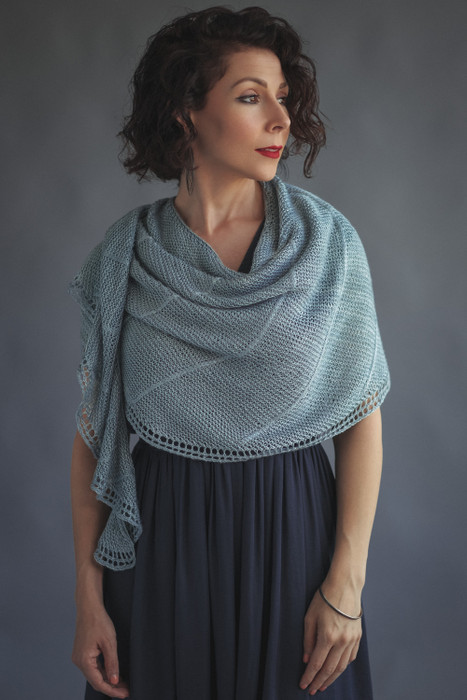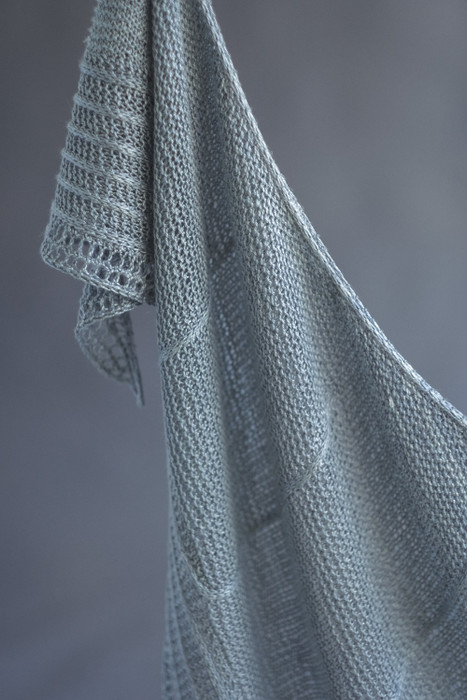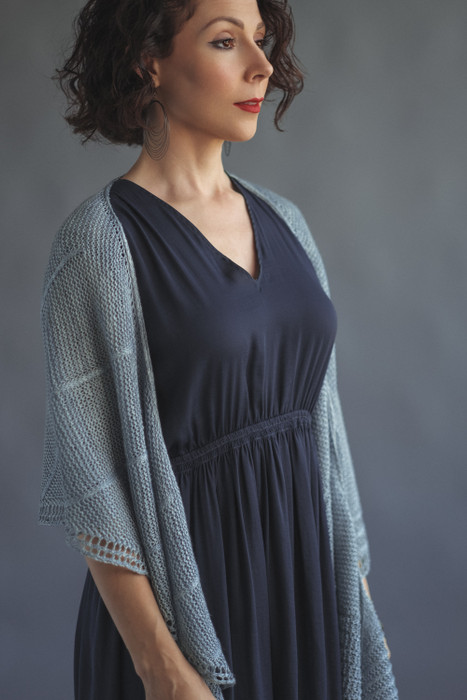SIZES:
Updated Version: Expression Fiber Arts Ephemeral Fingering yarn (548 yds/500 m per 3.5 oz/100 g skein)
Shown in color: Charlotte Ephemeral Fingering
Updated Version made with two skeins Ephemeral Fingering.
Original Version: Expression Fiber Arts Allure Fingering yarn (218 yds/200 m per 1.7 oz/50 g skein)
Shown in color: Galene Allure Fingering
Original Version made with four skeins Allure Fingering.
If those colors aren't available, any from this category will work.
NEEDLES:
Updated Version: US 4 (3.5 mm) 24” (min.) circular needles, or size needed to obtain gauge
Original Version: US 5 (3.75 mm) 24” (min.) circular needles, or size needed to obtain gauge
SKILL LEVEL:
Intermediate - This pattern is for those who feel comfortable with knitting and have made a few projects, using various skills and techniques. Skills/concepts include wrap and turn short rows, decreases, charts, and blocking.
Notes from the Designer:
Galene: an Ancient Greek goddess who personified the calm seas. Imagine a calm day at the beach, listening to the gentle series of waves lapping at the shoreline. That is the feeling of this shawl, from the soft blue of the yarn to the rhythmic nature of garter stitch, occasionally interrupted by a simple column of slipped stitches. The feel of the silk and the curve of the shape make it easy to wear around your shoulders.
This shawl begins at the narrow end and gradually increases, forming slipped stitch columns as you go. The end of the shawl is worked using short rows. This causes the slipped stitch columns to change direction and run perpendicular to the body of the shawl. The stitches are not complicated, as the body of the shawl is largely garter stitch. The short rows are worked with basic wrap and turns and do not require "picking up the wraps.”
- Click the Videos tab to watch a tutorial for this pattern.
- The pattern begins at the narrow end and gradually increases in width. The body of the shawl is mostly garter stitch, interrupted by repeating columns of slipped stitches.
- Stitch markers are used to help you identify when to slip the stitches. As this is done on the WS, they are not as easy to see as they are from the RS. Using the markers is completely optional.
- Slipped stitches are worked "as if to purl” with the yarn carried in front, unless otherwise noted.
- Typically, when working slipped stitches, you want to carry the yarn loosely behind the work, so as not to gather the work. In this case, however, you DO want to raise the stitches in the columns. Do not pull the yarn tight, but work it with your normal tension.
- When working the beginning of a WS row, be careful not to drop the yarn over when moving your yarn from front to back after the initial sl wyif. This is easy to have happen, which will throw off your stitch count, and interrupt the edge stitch pattern.
- If you are new to reading charts, you may find it helpful to use highlighter tape or a sticky note to more easily keep track of which row you are working. Some knitters place this above the row they are working, while others prefer it below. Completely your choice! The sticky notes also give you a place to take notes that might be helpful to you.
Designed by Jane Vanselous
You'll receive a digital file only (instantly downloadable as a PDF) and won't be shipped anything. Please allow a few minutes for the download link to be emailed to you. If the email doesn't arrive within a few minutes, just
log in to your account on our site, and you'll see your Completed Orders. From there, you'll find the download link.
Happy knitting!
Chandi
New? Read about our pattern download process here.
“In every walk with nature one receives far more than he seeks.” - John Muir






 United States (USD)
United States (USD)
 United Kingdom (GBP)
United Kingdom (GBP)
 Canada (CAD)
Canada (CAD)
 European Union (EUR)
European Union (EUR)






















































































